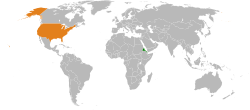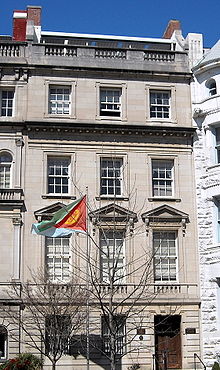| Revision as of 20:15, 20 September 2017 editKolbertBot (talk | contribs)Bots1,166,042 editsm Bot: HTTP→HTTPS (v462)← Previous edit | Revision as of 22:18, 29 October 2017 edit undoFusion2186 (talk | contribs)162 edits Removed NPOV box. There is no dispute and the conversation is dormant (2008).Next edit → | ||
| Line 1: | Line 1: | ||
| {{Use mdy dates|date=June 2013}} | {{Use mdy dates|date=June 2013}} | ||
| {{Infobox Bilateral relations|Eritrea – United States|Eritrea|USA|filetype=svg}} | |||
| '''Eritrea–United States relations''' are ] between ] and the United States. Joel Reifman is the current U.S. Ambassador to Eritrea. | '''Eritrea–United States relations''' are ] between ] and the United States. Joel Reifman is the current U.S. Ambassador to Eritrea. | ||
Revision as of 22:18, 29 October 2017
Bilateral relations
 | |
Eritrea |
United States |
|---|---|
Eritrea–United States relations are bilateral relations between Eritrea and the United States. Joel Reifman is the current U.S. Ambassador to Eritrea.
History
The U.S. government (USG) established a consulate in Asmara in 1942. In 1953, the USG signed a Mutual Defense Treaty with Ethiopia. The treaty granted the United States control and expansion of the important British military communications base at Kagnew near Asmara. In the 1960s, as many as 1,700 U.S. military personnel were stationed at Kagnew. In the 1970s, technological advances in the satellite and communications fields were making the communications station at Kagnew increasingly obsolete.

In 1974, Kagnew Station drastically reduced its personnel complement. In early 1977, the United States informed the Ethiopian government that it intended to close Kagnew Station permanently by September 30, 1977. In the meantime, U.S. relations with the Mengistu regime worsened. In April 1977, Mengistu abrogated the 1953 mutual defense treaty and ordered a reduction of U.S. personnel in Ethiopia, including the closure of Kagnew Communications Center and the consulate in Asmara. In August 1992, the United States reopened its consulate in Asmara, staffed with one officer. On April 27, 1993, the United States recognized Eritrea as an independent state, and on June 11, diplomatic relations were established with the appointment of a chargé d'affaires. The first U.S. Ambassador arrived later that year.
U.S. interests in Eritrea include consolidating the peace with Ethiopia, encouraging progress toward establishing a democratic political culture, supporting Eritrean efforts to become constructively involved in solving regional problems, and promoting economic reform.
The U.S. Embassy is in Asmara. Jennifer McIntyre is the Deputy Chief of Mission. Brian Shelbourn is the Consular Officer. Matthew Smith is the Management Officer. The Public Affairs Officer is Margery Benson. The Political/Military Officer and Defense Attache positions are vacant.
See also
References
![]() This article incorporates public domain material from U.S. Bilateral Relations Fact Sheets. United States Department of State.
This article incorporates public domain material from U.S. Bilateral Relations Fact Sheets. United States Department of State.
External links
| Africa |  | |
|---|---|---|
| Americas | ||
| Asia | ||
| Europe | ||